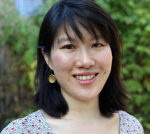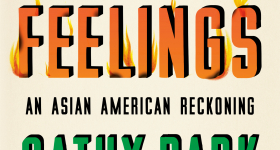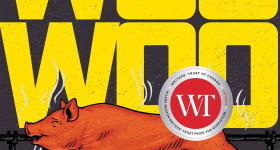I'm thrilled to share an excerpt from Michelle Kuo's groundbreaking memoir, Reading with Patrick. One of my favorite reads of 2017, Michelle so expertly and honestly interweaves American race relations, her relationship with a former student as he awaits trial for murder, and her love of literature and the connections it fosters. In this excerpt, Michelle grapples with how to break the news to her Taiwanese parents that instead of starting a new job in San Francisco after Harvard Law School, she's decided to return to the Mississpi Delta to support former student Patrick as he awaits his trail. Treat yourself to the book here. - Amy Zhang, Non-Fiction Editor
* * *
The drive from Arkansas to Indiana took eight hours. Somewhere in Missouri, I pulled into a service station to fill my tires with air. I could feel my heart beat in my chest.
First I needed to tell the source of my funding: the director of my fellowship, famed for her exacting speech, ironclad memory, and knockout red suits.
I called her.
“I need to see through Patrick’s case,” I said. She had read the Times piece, so I didn’t have to explain who he had been to me. “I need enough time to run through his options with him. And I just feel like I’ve been running away from the Delta and have unfinished business there.”
“How much time do you need?”
I didn’t know. “Until May,” I tried. I was just guessing. May sounded like enough time for me to reconnect but not so much that she would say no.
She calculated. “Seven months? Is that enough time?”
“Yes. Seven months,” I repeated, as if I had determined this beforehand.
I called the director of Centro, my organization. She asked, “Are you truly planning to come to California? Otherwise, we need to make preparations.”
For a moment I tried to imagine ditching California and staying in Helena permanently. Drinking beer on the porch, gardening alongside the kids, and wearing a big hat—I’d be moral and authentic, physically strong, like Tolstoy’s hero Levin in Anna Karenina, pushing a wheelbarrow and singing a tune he picked up from the muzhiks. But then I remembered all my drives to Memphis alone when my coupled friends went on vacation, and the old man who accosted me once in a grocery store, saying he fought the Japs in World War II. I couldn’t tell if he was expressing alliance or enmity; that depended on what kind of Asian he saw.
“No, no, I’m not going to stay,” I said. “I’ve been practicing my Spanish,” I added, hoping she wouldn’t say anything in Spanish. Otherwise, I’d say, Hello, hello? and hang up. But she continued in English: “Good luck, keep us posted.”
Then I had to call Adina about our apartment in San Francisco. She had just helped my mom and me move in, unpacking dishes and lamps. I apologized. I insisted that she keep my security deposit. I said I was flying back to get my stuff.
Last—my parents. Last because I feared them the most. The past couple of years had been rough. I had made the mistake of telling them a first-year associate’s salary at a New York law firm. They had no idea that a lawyer made so much. The idea that I would turn it down seemed crazy to them. A family fight ensued. In its dynamic of expectation and disappointment, it reprised the fight we’d had two years before in the Delta. But this time I had learned: Don’t ask for permission; stand firm. My brother took my side, which helped. By the time graduation rolled around, my mom and dad had altogether forgotten about the fight. “Come home,” they said; they knew I needed a place to study for the bar. “We’ve always supported what you want,” they continued, model revisionist historians.
Home has always been the best place to study. In our house, a person studying is pampered like a king. Nobody interrupts you. I made a hamlet out of their kitchen table, a castle out of books and notes. My dad listened as I recited tedious rules on contracts and torts, occasionally interrupting with, “That’s a stupid law; here’s why.” My mother popped in with fruit and tea. Cutting a mango, she sliced the meatiest parts onto a plate for me and left herself the core to gnaw on.
My best friend was getting married two days before my bar exam, and my parents had looked on dubiously as I packed my suitcase, a dress smashed under a mound of heavy tomes. “I’ve never heard of anybody going to a wedding before a big test,” my dad observed. But he didn’t say anything more.
The night before I left, my mother took me aside to tell me that she, too, had had a momentous exam, back in Taiwan. A talented high school student, she wanted to be a doctor. To do so, she had to take a battery of tests at the end of her senior year. In other words, the fulfillment of her professional dream hinged on a test she took as a teenager. It is a trauma-producing system: As in Japan or Korea or China, shortly before or after the exam, suicides could be counted on. On the day of the physics test, she panicked. She failed. She told me her score and looked away. I saw her face before she turned, and in this moment, especially, I loved her deeply.
My mother cooked alone, cleaned alone, and worked full- time. In her late twenties, her big dream was to get a Ph.D. She enrolled at Michigan State. But it was hard with two kids, not to mention her aging in-laws and sister-in-law, all crowded in our house; she dropped out. Like a lot of women of her generation, especially immigrant women, she got little encouragement. Much later, she read an essay I wrote, a seed of this book. She wrote: I read second time this morning, and I tears, And read again, It is real touched and gave people’s feeling that it is real story. Keep writing, write down all your feeling every day.
When I was growing up, my father had waited outside until my piano lessons finished, but my mother often tried to catch the tail end, captivated by my piano teacher. “How do you make the sound last?” my teacher would ask me, unaware of her question’s existential agitation. She’d strike a key. The sound would soar then fade. We’d be quiet. She’d strike again. We’d wait. The sound would last. “Now you try,” she’d say. My mother leaned toward my hand, watching. She was not regulating me, not monitoring my learning—in fact, for a precious moment she had forgotten me. She wished to play herself but thought it would be a luxury. The trope was true: She gave me what she wanted. When I practiced, I could hear her humming along in the kitchen. The clear, bright tones of her voice rose above the vegetables being chopped.
Tiger mom has become a shorthand to describe parents, usually Asian, with rigorous discipline. For me the term fails absolutely. It mistakes a person’s fragility for her power. My mother was authoritarian about learning because she didn’t know how else to be. It was not a choice among pedagogies; it was desperation. Without the success of her children, who would she be?
While I studied for the bar at home, I read Pnin, Nabokov’s hilarious tale of a Russian émigré in upstate New York. The book opens with bald-headed Pnin on a train, on his way to give a lecture, not knowing that he is on the wrong train. I was thrilled. Pnin! Here was the immigrant of my dreams. Not miserabilist Chinese railroad workers, not the coolies spat upon, not the Japanese unjustly interned. Pnin mastering English phrases—okey-dokey and to make a long story short; Pnin captivated by the American washing machine, stuffing it with shorts and handkerchiefs, just to watch them tumble endlessly like dolphins; Pnin triumphant after an excruciating tooth surgery, showing off his new treasure—a set of false teeth, which smiled back at him, and which he frequently took in and out of his mouth to show colleagues. Pnin was mocked cruelly behind his back and called a freak. Pnin had no idea. Poor Pnin! Heroic Pnin!
So Pnin was nothing like my parents—they weren’t clumsy, had never heard of Pushkin, didn’t pronounce difficulty as dzeefeecooltsee. But weren’t they, after all, more like Pnin? Didn’t they have Pninian moments? My mother: “Do lots of yogurt,” thinking yoga and yogurt were the same word. Talking about her first years in America and her discovery of the hamburger, she sighed with happiness. My father slurped his noodles in large ghastly gulps of saliva and hunger; his glasses fogged up—he took off his glasses to improve his speed.
My parents put on no airs. They had been shocked by the amount a lawyer made because they didn’t know a lawyer. My parents’ lack of advice for college, beyond telling me to become a doctor and not to date, was really evidence of how innocuous they turned out to be. So this, after all, explained their dogmatic style of advice—they suspected they couldn’t help me beyond what they’d already done: given me a childhood filled with opportunity. It turned out that, just as I knew Pnin was on the wrong train, I had the power to situate my parents in the world, to write them down. I was stronger than they were.
Thoughts of my parents continued to flood my mind as I turned in to their driveway. Pnin was lovable because his trauma was hidden. One never said: Foreign Pnin! Immigrant Pnin! Pnin Burdened by History! Here was the pleasure of Pnin: His failure to comprehend was so consistent, and so stubborn, and so masterful, that you forgot the world that failed him. I thought about my parents, who, like Pnin, were products of forces beyond their control. My dad himself was the child of immigrants: His mother and father had left China for Taiwan in 1949, and, like most in that generation of refugees, never saw their family members again. My parents had grown up under martial law in Taiwan and left before it democratized. Their memories of Taiwan remained frozen in the 1970s, when they left. Perhaps, more than they admitted to themselves, they no longer knew the Taiwan that had reared them. And maybe this was why they often reminded me that they’d lived in America longer than I had. They wanted me to regard them as Americans.
In the garage my parents rushed out to greet me, even though it was chilly, already autumn. My dad reached for my luggage; my mother touched my hair. They hadn’t eaten, they’d waited for me.
What would they think of my decision to return to the Delta? I knew they wanted me to get on with my life. They believed I made decisions selfishly, without consideration of them. And they were right: Learning how to disregard their opinions was essential to my life. I hoped they knew I did think of them tenderly.
Over dinner, I tried to speak more Mandarin than usual, something I do whenever I’m attempting to ingratiate myself. I told myself to speak slowly, in short, patient sentences. I’d always spoken English too fast. Though my father could catch most of it, my mother could not. How had we even communicated all these years? What did we talk about? We had needed grades and awards to mediate our relationship. How did the world view me? Did my teachers like me? Was I smart? The grade had answered these questions. The grade had made me legible.
And now that I was done with receiving grades for the rest of my life, it seemed that in place of grades we had only one thing: the story. Could I tell a story that moved them, that made them understand? This was the urgent thing.










Comments